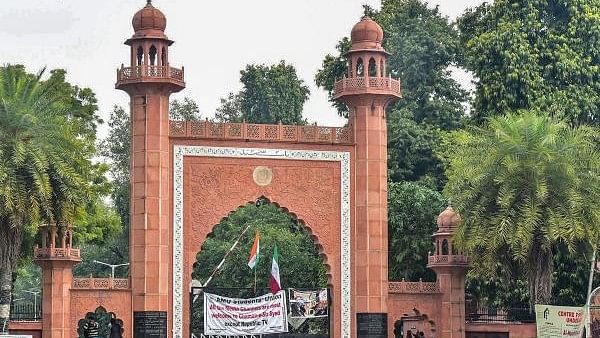
The Aligarh Muslim University.
Credit: PTI Photo
New Delhi: Supreme Court judge Justice Dipankar Datta on Friday held Aligarh Muslim University does not qualify as a minority institution, saying that it was neither established by any religious community, nor is it administered by a religious community which is regarded as a minority.
In his judgment, he also voiced strong discontent over the absence of insightful and constructive discussion, and also the ‘give’ and ‘take’ of ideas in true democratic spirit to build up a consensus in the matter.
With regard to the merit of the matter, he said the protection under Article 30(1) of the Constitution is not available to the institute and the submission of the appellants has no historic, legal, factual, or logical basis.
"It is my firm opinion that not only do the references not require an answer, it is also declared that AMU is not a minority educational institution and that the appeals seeking minority status for it should fail," Justice Datta said.
In his decision, Justice Datta pointed out there were no physical or virtual meeting of the members of the bench post-reservation of judgment, not to speak of meeting of minds, either immediately after hearing was concluded or even nine months' thereafter (either collectively or even in small groups of four-five) to explore which acceptable direction should the outcome sail.
A seven-judge bench, in a majority judgment of 4:3, overruled a 1967 Constitution bench decision which held that a minority community cannot claim to have established an educational institution if it was created by a statute. The CJI, who authored the majority opinion, said that the minority status of an educational institute will not cease merely because Parliament enacts a regulatory law.
The prologue of Justice Datta's dissenting opinion outlined the ordeal he faced due to late circulation of draft majority judgment and also deplored the absence of a consultative decision-making process.
The hearing in the matter was spread over eight days and the judgment was reserved on February 1, 2024. Justice Datta said the task of authoring the judgment had not been assigned to him, which obviously left him with no other option but to wait for the draft opinion to reach his residential office.
He said on October 17, 2024, the draft opinion authored by CJI, who will demit office on November 10, numbering 117 pages was placed on his desk. “No sooner had I completed reading the draft opinion, came a revised draft opinion of the CJI spread over almost the equal number of pages (117 pages). It reached my residential office in the evening of 25th October, 2024, i.e., on the eve of the short Diwali break. Inter alia, there was one very significant change in the revised draft,” Justice Datta said.
He said while in the first draft “the test laid down” by a Constitution bench of five-judges of this court in Azeez Basha (1967) “to determine if an educational institution is entitled to the guarantee under Article 30(1)” of the Constitution was proposed to be overruled, in the revised draft the view taken in Azeez Basha “that an educational institution is not established by a minority if it derives its legal character through a statute” has been proposed to be overruled.
He said the effect of the revised draft opinion of the CJI is the defenestration of the view taken in Azeez Basha (1967) that Aligarh Muslim University is not a minority institution.
About the Basha's judgment, Justice Datta said such a view has stood its ground for the last more than 50 years’. He said it is the only decision of this court where Article 30(1) was considered and law laid down keeping establishment and administration of a pre-independence era university in perspective as distinguished from schools and colleges, which have been the subject matter of other constitution bench decisions.
“On November 2, 2024, came another few pages from the office of the CJI containing corrections effected in quite a few of the paragraphs of the revised draft opinion in track changing mode with paragraph 72 being altogether deleted”, he said.
Justice Datta said, “Here, a Constitution Bench of 7 (seven) Judges had apparently embarked on a voyage to interpret Article 30(1) of the Constitution navigating through considerable weight of materials without any physical or virtual meeting of the members of the bench post-reservation of judgment, not to speak of meeting of minds, either immediately after hearing was concluded or even 9 (nine) months thereafter (either collectively or even in small groups of four-five) to explore which acceptable direction should the outcome sail”.
